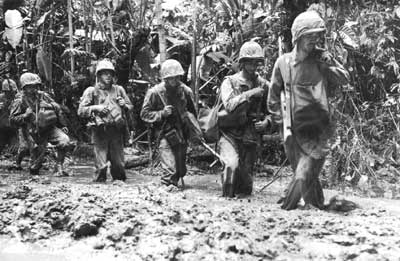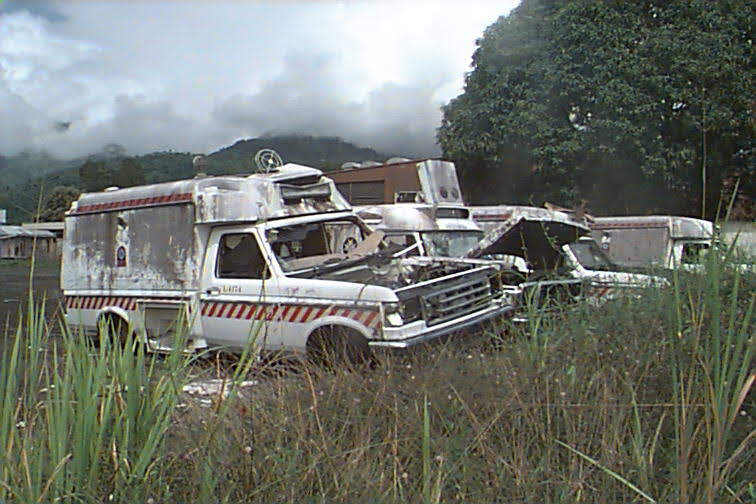|
Pepetua Serero
Pepetua Serero (died June 14 1989) was a Bougainvillean activist. Serero was raised in Guava village on Bougainville, and attended Catholic mission schools run by the Marist Order. She later worked as a broadcast officer for the Bougainville radio station of the Australian colonial administration. In August 1987, along with her cousin Francis Ona, she held a meeting of landowners surrounding the Panguna mine and formed a new, younger and more radical executive of the Panguna Landowners Association, with Serero as chairperson (chairlady) and Ona as general secretary. She was an outspoken advocate for the rights of local landowners and against the environmental damage caused by the mine. Serero had been ill from the beginning of the crisis that was to become the Bougainville Civil War, and died from an asthma attack in June 1989, only months after the conflict over the mine had turned into a fight over Bougainvillean secession. Her cousin and colleague in the Panguna Landowners' Asso ... [...More Info...] [...Related Items...] OR: [Wikipedia] [Google] [Baidu] |
Bougainville Island
Bougainville Island (Tok Pisin: ''Bogenvil'') is the main island of the Autonomous Region of Bougainville, which is part of Papua New Guinea. It was previously the main landmass in the German Empire-associated North Solomons. Its land area is . The population of the whole province, including nearby islets such as the Carterets, is approximately 300,000 (2019 census). The highest point is Mount Balbi, on the main island, at . The much smaller Buka Island, , lies to the north, across the wide Buka Strait. Even though the strait is narrow, there is no bridge across it, but there is a regular ferry service between the key settlements on either side. The main airport (or airstrip) in the north is in the town of Buka. Bougainville is the largest island in the Solomon Islands archipelago. Most of the islands in this archipelago (which are primarily concentrated in the southern and eastern portions of it) are part of the politically independent Solomon Islands. Two of these islands ... [...More Info...] [...Related Items...] OR: [Wikipedia] [Google] [Baidu] |
Francis Ona
Francis Ona (c. 1953 – 24 July 2005) was a Bougainville secessionist leader who led an uprising against the Government of Papua New Guinea as part of the Bougainville Civil War. He and his followers were concerned about the environmental and social effects of the operation of the Panguna mine by Bougainville Copper, a subsidiary of Rio Tinto Group. On 17 May 1990, Ona declared the independence of the Republic of Me'ekamui."The Bougainville independence referendum: Assessing the risks and challenges before, during and after the referendum" by Jo Woodbury January 2015; Commonwealth of Australia It was not recognised internationally. In May 2004 Ona proclaimed himself "King of Me'ekamui." While resisting the peace process and 2005 elections, Ona mostly stayed in a safe haven, where his BRA forces controlled territory. He died of malaria in his village. Secessionist leader Ona was at one time employed by Bougainville Copper at the mine, but he became increasingly critical of its ... [...More Info...] [...Related Items...] OR: [Wikipedia] [Google] [Baidu] |
Panguna Mine
The Panguna mine is a large copper mine located in the Autonomous Region of Bougainville, in the east of Papua New Guinea. Panguna represents one of the largest copper reserves in Papua New Guinea and in the world, having an estimated reserve of one billion tonnes of ore copper and twelve million ounces of gold. The mine has been closed since 1989 and has ceased all production. History The discovery of vast copper ore deposits in Bougainville's Crown Prince Range led to the establishment of the copper mine in 1969 by Bougainville Copper Ltd, a subsidiary of the Australian company Conzinc Rio Tinto of Australia. The mine began production in 1972, with the support of the Papua New Guinea National Government as a 20% shareholder. In contrast to this, the Bougainvilleans received 0.5–1.25% share of the total profit. The site was at the time the world's largest open-pit copper/gold mine, generating 12% of PNG's GDP and over 45% of the nation's export revenue. The mine caused deva ... [...More Info...] [...Related Items...] OR: [Wikipedia] [Google] [Baidu] |
Bougainville Civil War
The Bougainville conflict, also known as the Bougainville Civil War, was a multi-layered armed conflict fought from 1988 to 1998 in the North Solomons Province of Papua New Guinea (PNG) between PNG and the secessionist forces of the Bougainville Revolutionary Army (BRA), and between the BRA and other armed groups on Bougainville. The conflict was described by Bougainvillean President John Momis as the largest conflict in Oceania since the end of World War II in 1945, with an estimated 15,000–20,000 Bougainvilleans dead, although lower estimates place the toll at around 1,000–2,000. Hostilities concluded under the Bougainville Peace Agreement in 1998. The national (PNG) government agreed to the founding of the Autonomous Bougainville Government and to certain rights and authorities which the autonomous government would have over what became known as Bougainville Province, which includes outlying small islands in addition to Bougainville Island itself. Historical background ( ... [...More Info...] [...Related Items...] OR: [Wikipedia] [Google] [Baidu] |
Bougainville Revolutionary Army
The Bougainville Revolutionary Army (BRA) was a secessionist group formed in 1988 by Bougainvilleans seeking independence from Papua New Guinea (PNG). The leader of the BRA was Francis Ona who led the BRA against the Papua New Guinea Defence Force during the violent 10 year conflict. Not all BRA members agreed to the Peace Treaty and boycotted it, and have held out in an official no-go zone, protected by members of the Meekamui Defence Force, currently commanded by Moses Pepino. BRA leaders argued that Bougainville is ethnically part of the Solomon Islands and has not profited from the extensive mining that has occurred on the island. In 1989, BRA leaders proclaimed Bougainville independent from PNG and established the Autonomous Bougainville Government (ABG). As a result, fighting between the BRA and the PNG Defence Force, with support from Australia, escalated. In January 1991, the Honiara Declaration [...More Info...] [...Related Items...] OR: [Wikipedia] [Google] [Baidu] |
People From The Autonomous Region Of Bougainville
A person ( : people) is a being that has certain capacities or attributes such as reason, morality, consciousness or self-consciousness, and being a part of a culturally established form of social relations such as kinship, ownership of property, or legal responsibility. The defining features of personhood and, consequently, what makes a person count as a person, differ widely among cultures and contexts. In addition to the question of personhood, of what makes a being count as a person to begin with, there are further questions about personal identity and self: both about what makes any particular person that particular person instead of another, and about what makes a person at one time the same person as they were or will be at another time despite any intervening changes. The plural form "people" is often used to refer to an entire nation or ethnic group (as in "a people"), and this was the original meaning of the word; it subsequently acquired its use as a plural form of ... [...More Info...] [...Related Items...] OR: [Wikipedia] [Google] [Baidu] |
1989 Deaths
File:1989 Events Collage.png, From left, clockwise: The Cypress Street Viaduct, Cypress structure collapses as a result of the 1989 Loma Prieta earthquake, killing motorists below; The proposal document for the World Wide Web is submitted; The Exxon Valdez oil tanker runs aground in Prince William Sound, Alaska, causing a large Exxon Valdez oil spill, oil spill; The Fall of the Berlin Wall begins the downfall of Communism in Eastern Europe, and heralds German reunification; The United States United States invasion of Panama, invades Panama to depose Manuel Noriega; The Singing Revolution led to the independence of the Baltic states of Estonia, Latvia, and Lithuania from the Soviet Union; The stands of Hillsborough Stadium in Sheffield, Yorkshire, where the Hillsborough disaster occurred; 1989 Tiananmen Square protests and massacre, Students demonstrate in Tiananmen Square, Beijing; many are killed by forces of the Chinese Communist Party., 300x300px, thumb rect 0 0 200 200 1989 Loma ... [...More Info...] [...Related Items...] OR: [Wikipedia] [Google] [Baidu] |
Deaths From Asthma
Death is the irreversible cessation of all biological functions that sustain an organism. For organisms with a brain, death can also be defined as the irreversible cessation of functioning of the whole brain, including brainstem, and brain death is sometimes used as a legal definition of death. The remains of a former organism normally begin to decompose shortly after death. Death is an inevitable process that eventually occurs in almost all organisms. Death is generally applied to whole organisms; the similar process seen in individual components of an organism, such as cells or tissues, is necrosis. Something that is not considered an organism, such as a virus, can be physically destroyed but is not said to die. As of the early 21st century, over 150,000 humans die each day, with ageing being by far the most common cause of death. Many cultures and religions have the idea of an afterlife, and also may hold the idea of judgement of good and bad deeds in one's life ( h ... [...More Info...] [...Related Items...] OR: [Wikipedia] [Google] [Baidu] |
Papua New Guinean Independence Activists
Papua most commonly refers to: * New Guinea, the world's second-largest island in the southwestern Pacific Ocean * Western New Guinea, the western half of the island of New Guinea, which is administered by Indonesia. ** Papua (province), an Indonesian province in the north coast of Western New Guinea * Papua New Guinea, a country occupying the eastern half of the island of New Guinea * Territory of Papua (1884–1949), a British/Australian-administered territory in southeastern New Guinea * Southern Region, Papua New Guinea, officially known as Papua Region up to 2011 Other uses * Papua Beach, on the south Atlantic island of South Georgia * Papua Island, off the north tip of the Antarctic Peninsula * , a British frigate in service in the Royal Navy from 1944 to 1945 See also * Papuan (other) * West Papua (other) * * Papuasia Papuasia is a Level 2 botanical region defined in the World Geographical Scheme for Recording Plant Distributions (WGSRPD). It lies in ... [...More Info...] [...Related Items...] OR: [Wikipedia] [Google] [Baidu] |


_1938.jpg)
